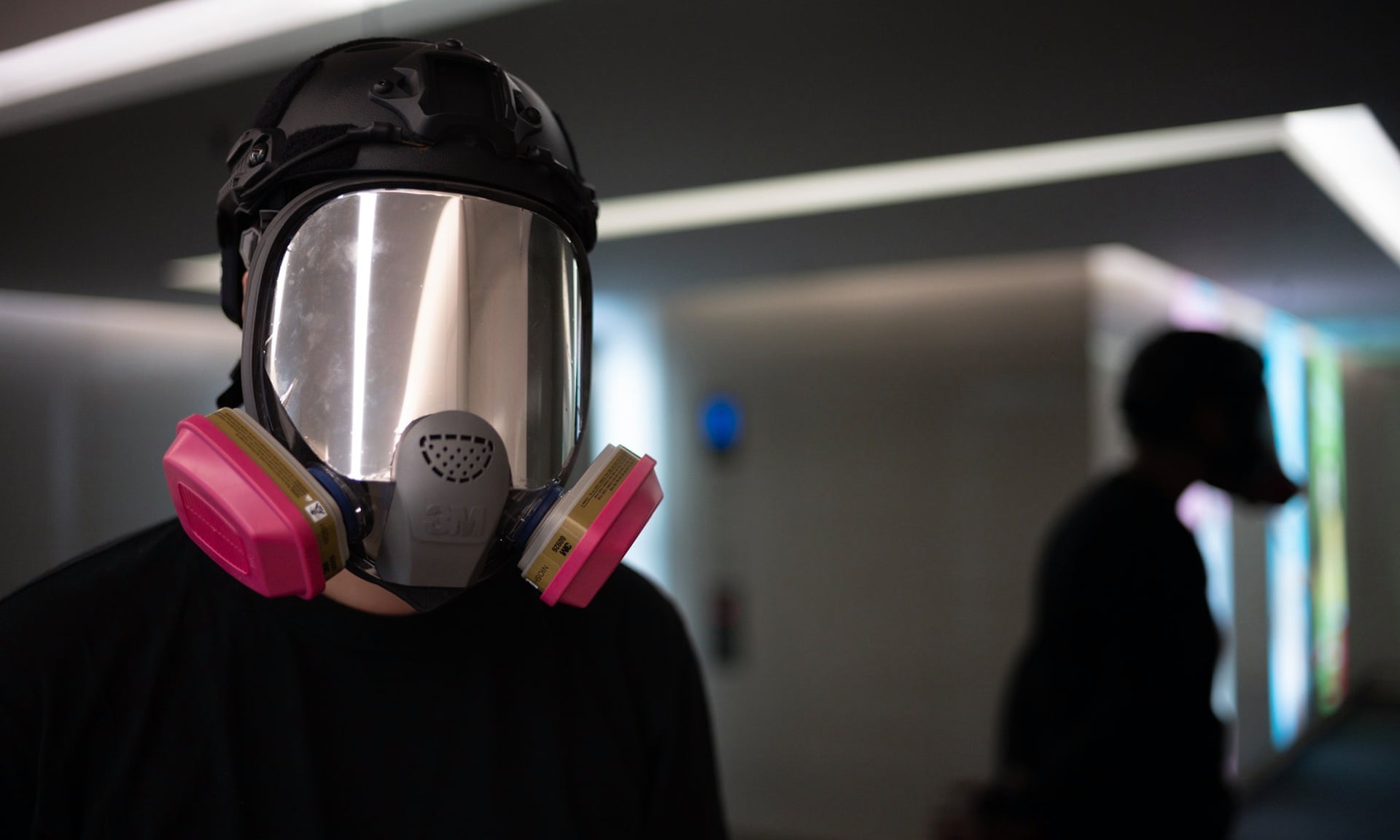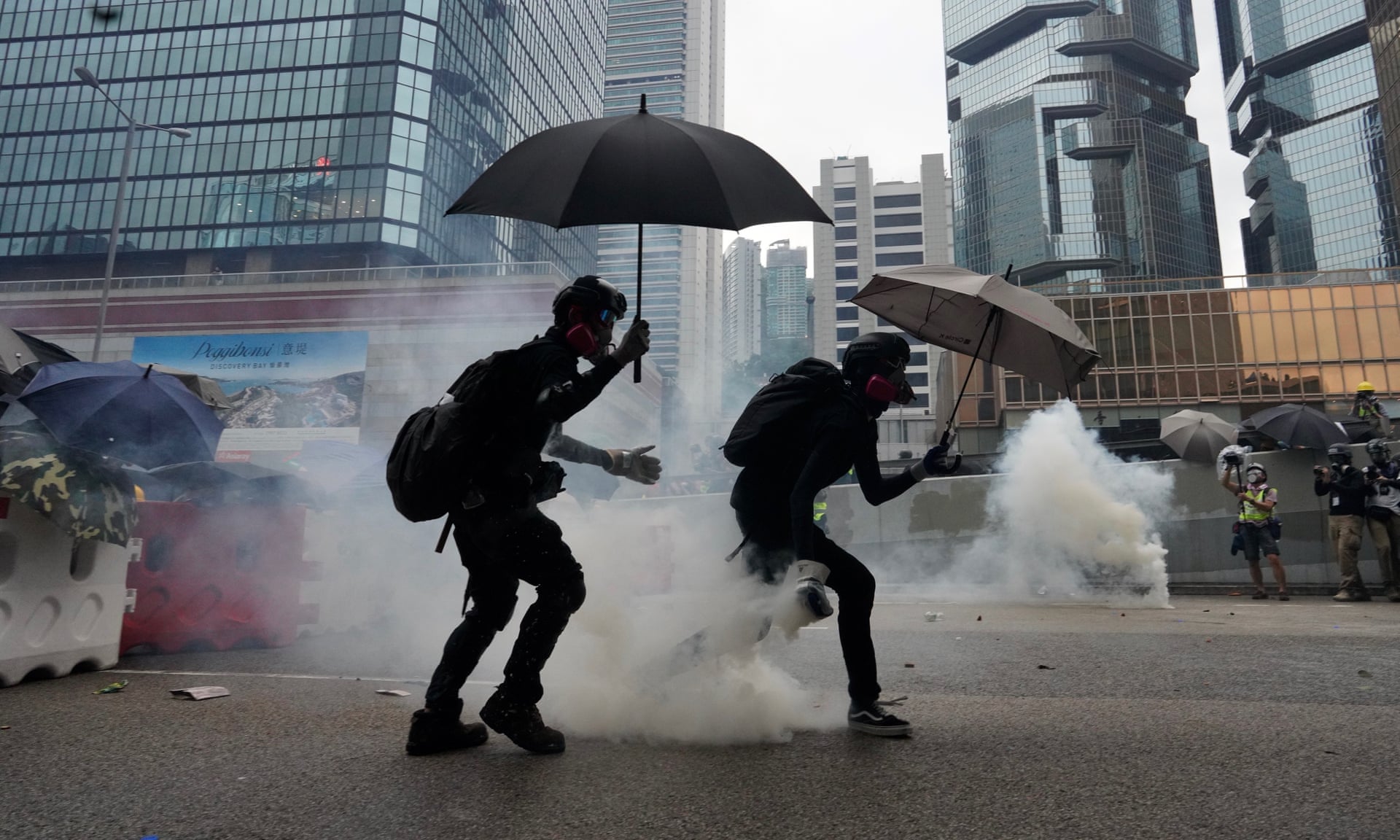Anger is rising as the government crackdown intensifies, and protesters are prepared for confrontation and sacrifice
By Verna Yu in Hong Kong
Computer engineer Ryan Lee started taking part in the protests in June.
Ryan Lee, a 27-year-old computer engineer, only started taking part in Hong Kong’s demonstrations in June.
Since then, it has been a steep learning curve.
He has tackled a police officer to the ground to rescue another protester, tossed teargas canisters back at the police and covered the gas grenades with the metal dishes commonly used in Hong Kong for steaming fish.
Within weeks Lee has transformed into a militant “fighter” – one of the black-clad protesters in full protective gear who have faced off week after week with police behind makeshift barricades. Saturday was no exception – violent clashes between protesters and police erupted throughout the city.
“The government’s hardline attitude is only catalysing the movement,” Lee said.
He has tackled a police officer to the ground to rescue another protester, tossed teargas canisters back at the police and covered the gas grenades with the metal dishes commonly used in Hong Kong for steaming fish.
Within weeks Lee has transformed into a militant “fighter” – one of the black-clad protesters in full protective gear who have faced off week after week with police behind makeshift barricades. Saturday was no exception – violent clashes between protesters and police erupted throughout the city.
“The government’s hardline attitude is only catalysing the movement,” Lee said.
“They might have arrested 1,000 people and more, but there are just as many people in the frontline because they are constantly being replaced.”
Since early June, Hong Kong has been embroiled in its worst political crisis in decades.
Since early June, Hong Kong has been embroiled in its worst political crisis in decades.
The wave of protests, sparked by the controversial extradition bill under which individuals can be sent to mainland China for trial, has entered its 15th week.
Over the past three months, the protests have become a broader and increasingly violent anti-government movement as the animosity between demonstrators and police reaches boiling point.
Last weekend, Lee was among those who threw teargas canisters back at the police in a violent confrontation that lasted about 40 minutes before the crowds dispersed and water cannon arrived.
Last weekend, Lee was among those who threw teargas canisters back at the police in a violent confrontation that lasted about 40 minutes before the crowds dispersed and water cannon arrived.
He said the protesters’ determination to fight against the police as long as they could was “a show of our stance and our beliefs”.
“When the police abuse their powers and face no consequences, a revolution is justified,” said Lee.
“When the police abuse their powers and face no consequences, a revolution is justified,” said Lee.
“I accept revolution and bloodshed. Revolution is a war and no war is without violence … If our violence can bring about positive changes, I am willing to be involved.”
Lee’s anger had already been fuelled by the police’s use of violence, and the government’s failure to set up an independent body to investigate police wrongdoing.
But the arrests of a number of prominent pro-democracy figures – along with government hints that it was thinking about a draconian emergency law allowing it to make arrests and suppress communications – further enraged him.
Lee’s anger had already been fuelled by the police’s use of violence, and the government’s failure to set up an independent body to investigate police wrongdoing.
But the arrests of a number of prominent pro-democracy figures – along with government hints that it was thinking about a draconian emergency law allowing it to make arrests and suppress communications – further enraged him.
Some 1200 people have been arrested since protests began.
Given the threat of the new law, and the possibility of China mobilising the People’s Liberation Army, wasn’t Lee worried that the protesters’ current tactics might actually lead to their existing rights being eroded?
Given the threat of the new law, and the possibility of China mobilising the People’s Liberation Army, wasn’t Lee worried that the protesters’ current tactics might actually lead to their existing rights being eroded?
“But there is no other way out: we’ll have to burn together,” he said.
“In a war, ordinary people always end up sacrificing.”
Rock Chan, a technician and former barman, shares the same outrage.
Rock Chan, a technician and former barman, shares the same outrage.
He too has been on the frontline in recent protests, providing protective gear to fellow protesters and finding escape routes for them.
“The police did nothing to the white-clad men with sticks but said our umbrellas were weapons,” said the 33-year-old, referring to an incident in July when masked men rushed into a metro station to attack civilians indiscriminately.
Although the government had banned Saturday’s protests, has arrested pro-democracy figures and hinted at an emergency law, Chan said this would not dampen his resolve.
“The more restrictions they impose on us, the stronger the pushback is,” he said.
“The police did nothing to the white-clad men with sticks but said our umbrellas were weapons,” said the 33-year-old, referring to an incident in July when masked men rushed into a metro station to attack civilians indiscriminately.
Although the government had banned Saturday’s protests, has arrested pro-democracy figures and hinted at an emergency law, Chan said this would not dampen his resolve.
“The more restrictions they impose on us, the stronger the pushback is,” he said.
“I want to tell them that we will not back down and we’re not afraid.”
Chan, who took part in the Umbrella movement in 2014, said he and others had learned from its mistakes.
Chan, who took part in the Umbrella movement in 2014, said he and others had learned from its mistakes.
The 79-day protest, part of the Occupy movement, ended peacefully, after failing to pressurise the government into granting electoral reforms that would give ordinary people a free vote to elect their leader and legislature.
People left the occupied thoroughfare voluntarily on the day the site was cleared.
Leaders of the movement have since been jailed.
“The Umbrella movement was too peaceful. Having just a bunch of people sitting there didn’t pose any threat to the government,” Chan said.
“The Umbrella movement was too peaceful. Having just a bunch of people sitting there didn’t pose any threat to the government,” Chan said.
“We lost the battle completely. Now we have learned from our mistakes.”
Protesters running for cover from teargas during the demonstrations.
Both young men – who do not know each other and were interviewed separately by the Observer – believe a revolution is needed “to save Hong Kong”.
Both risk being arrested and jailed for rioting, which carries a maximum sentence of 10 years.
But they both felt strongly that rights and freedoms, as well as Hong Kong’s way of life, had been eroded under Chinese rule – and that that was worth fighting for.
“We need a revolution to start afresh, but unfortunately we’re under China,” Chan said.
“We need a revolution to start afresh, but unfortunately we’re under China,” Chan said.
“My demand is actually very simple: I just want a real Hong Kong under a genuine ‘one country, two systems’ [principle].”
Asked how they saw the current crisis ending, both men believed there would be a further escalation of violence in the coming months if the government continued to ignore protesters’ demands.
Some suspect that China has set a deadline of 1 October – the 70th anniversary of the establishment of communist government – to end the chaos.
“I see a wave of escalation [before then] – I think people will use all means to force the government to respond to our demands,” said Lee.
Asked whether he was afraid of being arrested, Chan said he had lost sleep, but the wellbeing of Hong Kong mattered more to him.
Asked how they saw the current crisis ending, both men believed there would be a further escalation of violence in the coming months if the government continued to ignore protesters’ demands.
Some suspect that China has set a deadline of 1 October – the 70th anniversary of the establishment of communist government – to end the chaos.
“I see a wave of escalation [before then] – I think people will use all means to force the government to respond to our demands,” said Lee.
Asked whether he was afraid of being arrested, Chan said he had lost sleep, but the wellbeing of Hong Kong mattered more to him.
“It’s OK for me to be arrested,” he said, “but it’s not OK to lose our beloved Hong Kong.”
* Names have been changed to protect interviewees’ identities
* Names have been changed to protect interviewees’ identities

Aucun commentaire:
Enregistrer un commentaire